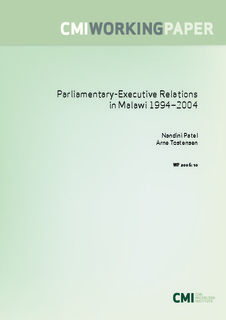| dc.contributor.author | Patel, Nandini | |
| dc.contributor.author | Tostensen, Arne | |
| dc.date.accessioned | 2008-02-19T08:27:30Z | |
| dc.date.accessioned | 2017-03-29T09:12:53Z | |
| dc.date.available | 2008-02-19T08:27:30Z | |
| dc.date.available | 2017-03-29T09:12:53Z | |
| dc.date.issued | 2006 | |
| dc.identifier.isbn | 82-8062-151-2 | |
| dc.identifier.issn | 0804-3639 | |
| dc.identifier.uri | http://hdl.handle.net/11250/2435959 | |
| dc.description.abstract | This article addresses the relationship between the legislative and executive branches of government in Malawi during the multi-party era from 1994 until
2004. The argument is threefold. First, the presidential nature of Malawi’s political regime assigns parliament to a secondary role. Second, the general framework of parliamentary-executive relations laid down in the constitution gives scope for accentuating this subordinate position through iterative practices. Third, the persistence of personalised patronage in Malawian politics leads to the further reinforcement of parliamentary subservience where political principles and positions are sacrificed on the altar of venality. A perception has spread that parliament is a mere pawn in the political game or a rubber stamp of the executive’s decisions. This article will seek to adduce empirical evidence to substantiate this argument. | |
| dc.language.iso | eng | |
| dc.publisher | Chr. Michelsen Institute | |
| dc.relation.ispartofseries | CMI Working paper | |
| dc.relation.ispartofseries | WP 2006: 10 | |
| dc.subject | Malawi | |
| dc.subject | Parliament | |
| dc.subject | Parliamentary-executive relations | |
| dc.subject | Politics | |
| dc.title | Parliamentary-Executive Relations in Malawi 1994-2004 | |
| dc.type | Working paper | |
